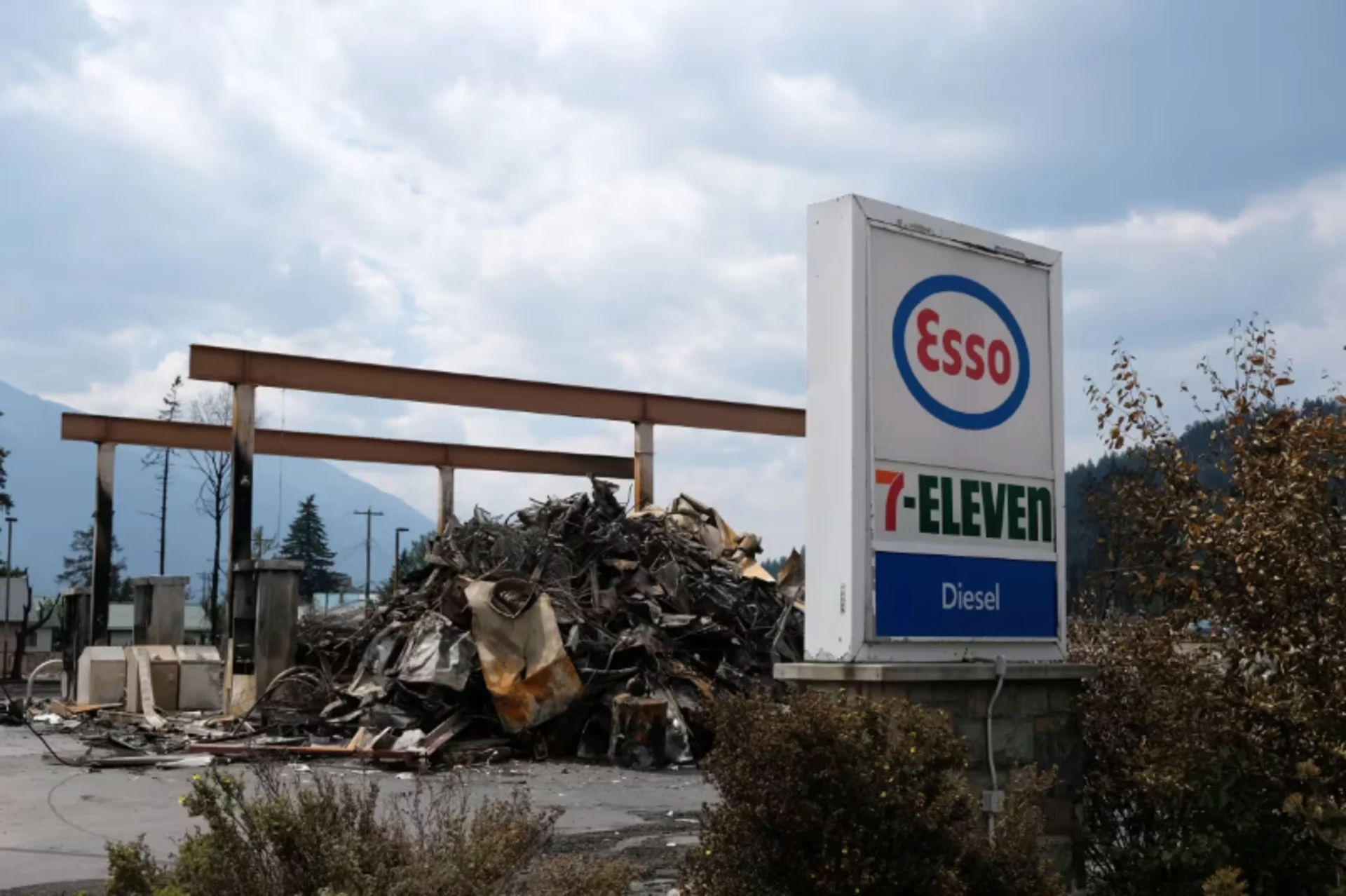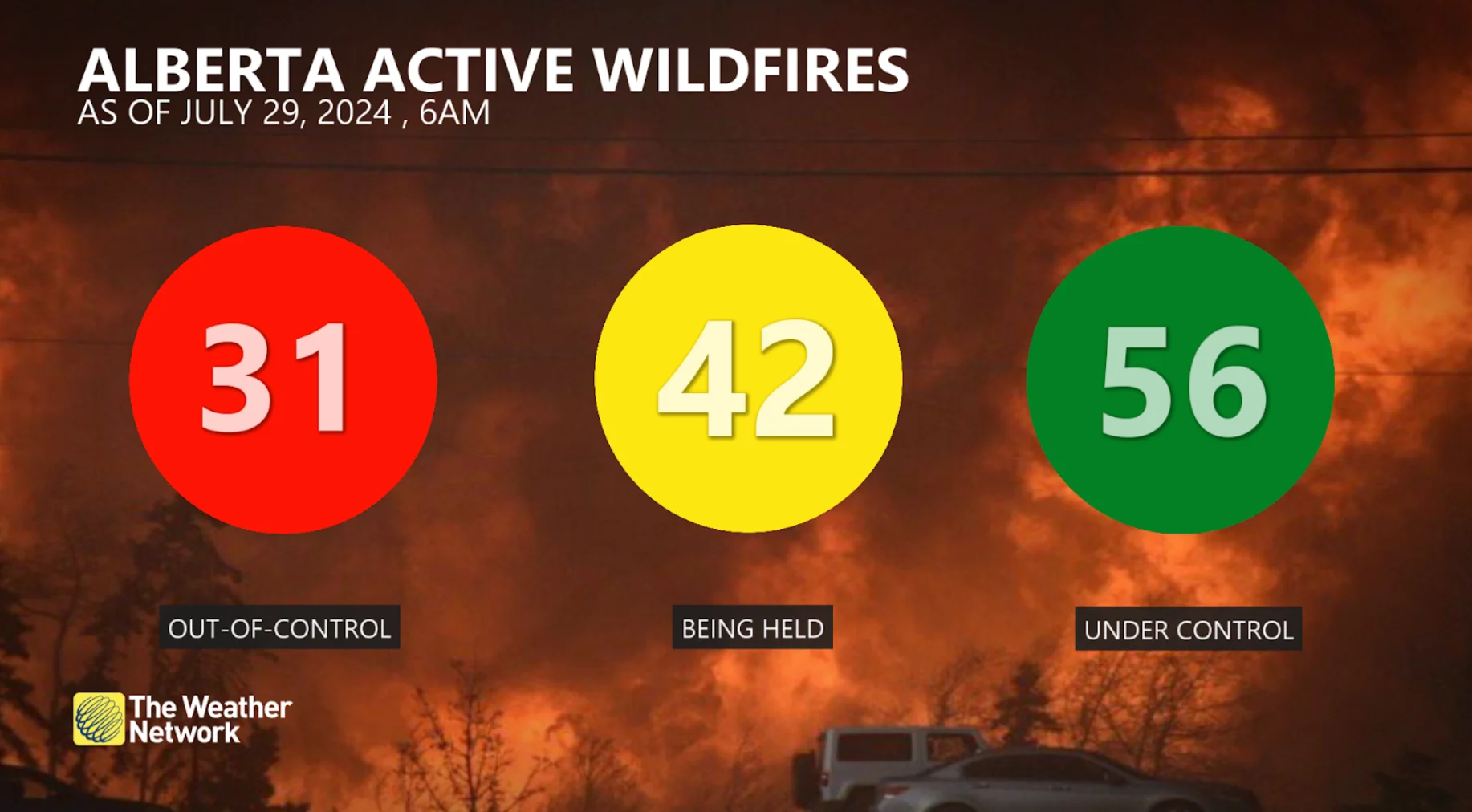
Jasper re-entry plans take shape, hot weather could reignite wildfire threat
Re-entry plans for thousands of people forced to evacuate from Jasper are taking shape even as rising temperatures this week threaten to reignite the wildfire threat to the devastated community.
The emergency advisory committee for the Municipality of Jasper has approved a list of criteria that must be met before residents are allowed back, which was announced in a statement late Monday.
But there is no timeline for when it will be enacted. Until the threat to the community subsides, evacuation orders will remain in effect and the gates of Jasper National Park will remain closed to visitors, officials say.
"Life safety will always remain the top priority, fire threat could require evacuation of the townsite at any point in the future," officials said in the statement Monday.
CANADA'S WILDFIRES: Visit The Weather Network's wildfire hub to keep up with the latest on the active wildfire season across Canada
The criteria for re-entry include: mitigating hazards in the community created by the fire damage; restoration of at least a basic level of emergency services including fire, EMS, police, and 911 dispatch; re-establishing critical public services, including health care, utilities and public works, and the available of services like gas, groceries, banking and pharmacy services.
Last Monday, flames threatening from the north and south of town triggered a mass evacuation of the national park. In all, more than 25,000 visitors and residents were ordered out by flames fuelled by parched conditions and severe winds.

By Wednesday evening, the fire advanced on the community, devastating one-third of the townsite. Within hours, an estimated 358 out of 1,113 buildings in Jasper were destroyed.
Wildfires within the Jasper townsite are out but the fire continues to burn out of control in the park. This week's return to hot, dry weather is expected to worsen the situation.
"It will drop the relative humidity, making it a little more challenging on the ground," said Alan Fehr, superintendent for Jasper Parks Canada, in a late Monday interview.
Recent rain and a break in the heat helped crews make progress in protecting the town, Fehr said.
"That's why we're taking advantage of all the personnel and all the resources that we have right now to try to get things in place for when that warm weather comes."
Fehr said crews have been working to strengthen key defences around the townsite. Those efforts include a fireguard between Pyramid Lake and Highway 16, and a 30-centimetre high sprinkler system along the fireguard that surrounds the community.
Crews within the townsite are working to restore critical services, secure damaged properties and remove dangerous debris from the wreckage of burned buildings, Fehr said.
SEE ALSO: This Alberta wildfire was so strong, it generated its own lightning
He said surveys of the damage to buildings and infrastructure outside the townsite are being conducted and more details will be released this week. All bridges and roads assessed to date, including Highway 16, remain intact, he said.
An unstoppable firestorm
The fire that devastated the townsite is included in a complex that have now burned 36,000 hectares throughout the park. The Jasper Wildfire Complex includes the southern fire, which has now merged with a fire that had been threatening Jasper from the north, as well as the Utopia wildfire, burning near Miette Hot Springs.
After weeks of extreme heat, a cluster of lightning strikes last Monday ignited the flames, then severe winds fanned the fire toward town in a towering blaze that advanced rapidly, sending burning pine cones and showering embers toward the town.
Conventional firefighting methods were no match for the inferno.
WATCH: Scenes from the wildfires in Jasper that forced people to evacuate the city
Bucketing efforts by helicopter failed and water bombers couldn't fly due to heavy smoke. On the ground, crews using heavy equipment to build fireguards couldn't complete the work before having to pull back for safety and a last-ditch effort to use controlled burns to redirect the fire failed.
By Wednesday evening, as the flames began to burn homes and businesses, many first responders were ordered to evacuate the park due to dangerous conditions on the front line.
"The wind and smoke and the speed of the fire was incredible," Fehr said. "We got people out and I think, in the end, that's what matters most.
"Nobody lost their life. And we still have a community from which we can build."
Message from the King
In a Tuesday morning message from King Charles, he commended efforts of firefighting crews and expressed admiration for the people who will undertake the rebuild of the town.
Charles says he and his wife, Queen Camilla, are "immensely saddened" to see the damage from the massive wildfires, calling the picturesque Rocky Mountain tourist destination a "truly magical place" that has captivated travellers from Canada and abroad.
Charles expressed sympathy for those whose lives and livelihoods have been affected, particularly those who have lost property and were forced out.
"These are dark times, but we greatly admire the strength and resilience of so many people to persevere and rebuild," the King said in a written statement distributed through Rideau Hall.

RELATED: Jasper businesses face complicated recovery in tourism community
Royalty first came to visit the park in 1939, when King George VI and Queen Elizabeth, the Queen Mother, stayed at the Jasper Park Lodge's Outlook Cabin. Their daughter, Queen Elizabeth II, stayed there with her husband, Prince Philip, in 2005.
Charles also gave a nod to firefighters from elsewhere who have come to Alberta to assist efforts in tackling wildfires burning all over the province.
"The number of firefighters who have come from across the world to offer their services speaks not only to the sense of solidarity that exists within that professional community, but also the high regard in which Canada and Canadians are held around the world," Charles said.
International firefighters include crews from Mexico, Alaska, Australia and South Africa, which are being deployed to fires across the province.
As of Tuesday morning, 122 wildfires were burning across Alberta with more than 562,000 hectares burned to date this wildfire season.
Thumbnail image credit to Josh McLean/CBC News.
This article, written by Wallis Snowdon, was originally published for CBC News on Tuesday, July 30, 2024. It contains files from The Canadian Press.









